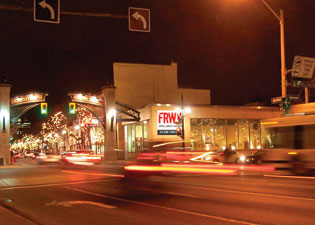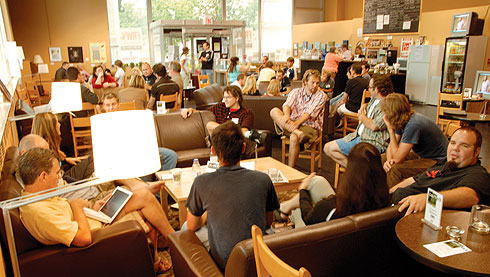 Pernell Goodyear, pastor at the Freeway church and café in Hamilton, Ont., serves up coffee, conversation and community. Learn more of his innovative strategies as he brings church to his community.
Pernell Goodyear, pastor at the Freeway church and café in Hamilton, Ont., serves up coffee, conversation and community. Learn more of his innovative strategies as he brings church to his community.
Salvationist: Your church is taking the Army into uncharted territory. What is the Freeway and how did it get started?
Pernell: In June 2001, The Salvation Army Winterberry Heights Community Church in Hamilton, Ont., decided to plant a “Gen X church†that would cater to a younger generation. At the invitation of THQ, I moved with my wife, Margie, and our kids to Hamilton and spent a year meeting people and shaping the ethos of what we thought a church community should be. Within a week, we cast off the Gen X label. We wanted a church that ministered to a wide range of people, not just 20- or 30-somethings. We also wanted to plant a church in the downtown core, rather than in the suburbs. Our neighbourhood is the third poorest in Canada. We picked it because we wanted to be part of urban renewal.
Having grown up in The Salvation Army, I felt that the way we had traditionally done things wouldn’t connect with the demographic we wanted to reach. We interviewed people in our area and documented what they thought about God, spirituality and church. Using this method, we were able to identify the stumbling blocks that prevent people from participating in a community of faith. Personally, I wanted to be part of a church that I could bring people to and was living what it said about Jesus.
Have you felt any tension being a non-traditional church in a denomination that is perceived, rightly or wrongly, as stressing conformity?
It has created some tension, but surprisingly our leaders are extremely excited about what we’re doing. Besides, The Salvation Army has a long history of reaching those who may be unreached by many other churches. The Freeway has had some success reaching a demographic missing from many other churches. And when push comes to shove, accomplishing mission and bringing in the Kingdom is what we’re all about. Now that we’re running a café and working out the tension of being thrust into a secular culture where we are trying to incarnate Jesus, I’m discovering that living with tension can actually be a good thing.
As for our philosophy of ministry, we completely resonate with the Army’s holistic mandate of “heart to God, hand to man.†We don’t want to be labelled a corps or a social service, we don’t talk in a Salvation Army language, but we do consider ourselves Jesus-followers. We love Army history, but don’t want to be bound by it. Our people don’t resonate with the traditional Army culture of bands, uniforms and military structure. At the same time, we don’t feel the rest of the Army necessarily needs to become like us.
Our approach to ministry is also somewhat different. Rather than starting programs to help poor people in our area, we have put out a call for people to become urban dwellers-to move into the neighbourhood and live incarnationally. Rather than just giving a hand out, we are creating a space where people can explore their creativity and find new friends. For example, we are starting a new after-school initiative this year where community kids can get a nourishing meal and one-on-one lessons in painting, guitar, DJing or computer design.

Describe the café. What kind of vibe are you trying to create?
We bought a former CIBC building in the downtown core and converted it. We didn’t want another church building with a sanctuary and stained glass. I’ve found that many churches are hard to access during the week-the doors are locked except for people who participate in the structured programs. Instead, we wanted a place where we could hang out and build relationships with people anytime. The casual atmosphere of a café, with its art, music and conversation, appealed to us. Church becomes an everyday lifestyle, rather than a place you go to once a week.
The café is based on a “third place†philosophy from a 1989 book called The Great Good Place by Ray Oldenburg. The idea is that people need three spaces: a place where they live, a place where they work and a third place where they can be among friends. This third place is a space where you can be yourself, build community and talk about the issues of the day. In North America, we put a lot of stock in our careers and family relationships. As we build bigger and bigger houses and spend more time at work, we isolate ourselves from our neighbours and become lonelier. We collect nice stuff, but we never really fill the internal void that is desperate for community. The café creates a space where people can find that community, where we don’t have to be defined by our jobs or how much money we make.
Critics might say that coffee-house culture is a trendy front for consumerism.
We don’t want to create more consumers. For that reason, we don’t pressure people to buy and we let people use our space for free. Everyone is allowed to hang out. Our values are reflected not only in who we serve but in what we serve. We make sure that our coffee and tea are fair trade and that, as much as possible, the food we serve is homemade, organic and locally grown. We do give away some food to our homeless neighbours, but we are not a soup kitchen or a drop-in centre.
We also created a space for up-and-coming artists and musicians to showcase their talent. Each month a new urban artist is invited to display and sell their work on our café walls. We also host a free opening where they can invite their friends and relatives. Every Friday night, local musicians play at the café. We give them free equipment rental, food and all the proceeds from the door. Not all of the artists are Christian because, during the week, we consider the café “non-religious.†The purpose of the café is not to corner people and force the gospel on them, but to build relationships and create a safe space.
Has moving into a permanent building helped or hindered your ministry?
In some ways it has hindered us. Before the café we weren’t as dependant on money. Now we have a bigger financial responsibility. The flip side is that we now have the opportunity to turn a profit. Our goal is that the coffee house will eventually fund itself and other initiatives in the community. We currently have about 20 volunteers who contribute a minimum of five hours a week.
Being in a building has also forced us to renew our focus on going out into the community. Many churches are based on an attractional model-build the church and people will come. From the beginning, we decided that’s not the way we wanted to grow our church. We’re more interested in creating missionaries to a culture. That becomes more difficult when you have a specific space for your church.
To offset this tendency, we’ve designed the Freeway as a safe place, a neutral ground. The non-religious surroundings make it easier for people to open up and be themselves. We believe that the relationships we are forming with our neighbours should be integrated with their normal day-to-day life. When the Christian Church got started 2,000 years ago, it existed seamlessly in the community-in people’s homes and in the marketplace-not because it was trying to be relevant, but because that’s where everyday life happened.
Your website www.FRWY.ca has some of the highest traffic of any Army site. How does the Internet enhance your sense of community?
We recently changed our church website to a blog, which is an easy way of creating daily entries without having to know a lot about technology. Rather than having a static website that looks like an online brochure, we keep things fresh and exciting by regularly updating the blog. We believe that sharing the journey and telling our stories are critical ways to enhance our sense of connectedness. When people read our blog, they’ll discover we’re nothing special-just a bunch of people trying to live Jesus as best we can.
We also have individual blogs where we check up on each other, so the web creates deeper community. It doesn’t substitute for face-to-face, heart-to-heart relationships, but helps us appreciate each others’ daily thoughts, ideas and struggles. It even helps craft our sermons. Rather than using cheesy illustrations of people we don’t know or who never really existed, we share personal stories and what we’ve learned through reading blogs. As a leader, it also helps me get the pulse of what’s happening-especially in a transient, growing, unchurchy community.
That commitment to community also affects your church leadership and structure. How is the Freeway different from a traditional Army congregation?
We don’t have a five-year plan at the Freeway. We don’t have a formal discipleship program. Instead of putting people through classes, we help them find Jesus organically though relationships. Things often spring up spontaneously. For example, after Hurricane Katrina, a young woman approached me and said, “I really feel led to do something for New Orleans.†Two weeks later, five of us jumped in a van, drove for 21 hours straight and worked for four days in the poorer neighbourhood. We got rid of mould in houses, ripping out drywall so that it could be ready for rebuilding-saving families about $10,000 each for what it would cost to have a company do it.
Since the beginning, we’ve tried to do things in community. It’s not “God gave Pernell a vision and he manipulates people to follow it.†We lead in community, without the hierarchy or structure that you have in many Army corps. We want to encourage people to become missional followers of Jesus, rather than belonging to programs. It makes it messy and challenging to lead, but it’s always better when Jesus works and speaks through us as a community of faith.